PUBLICATIONS
Annual Progress Report 2023
The Sustainable Tourism Observatory of South Tyrol (STOST)
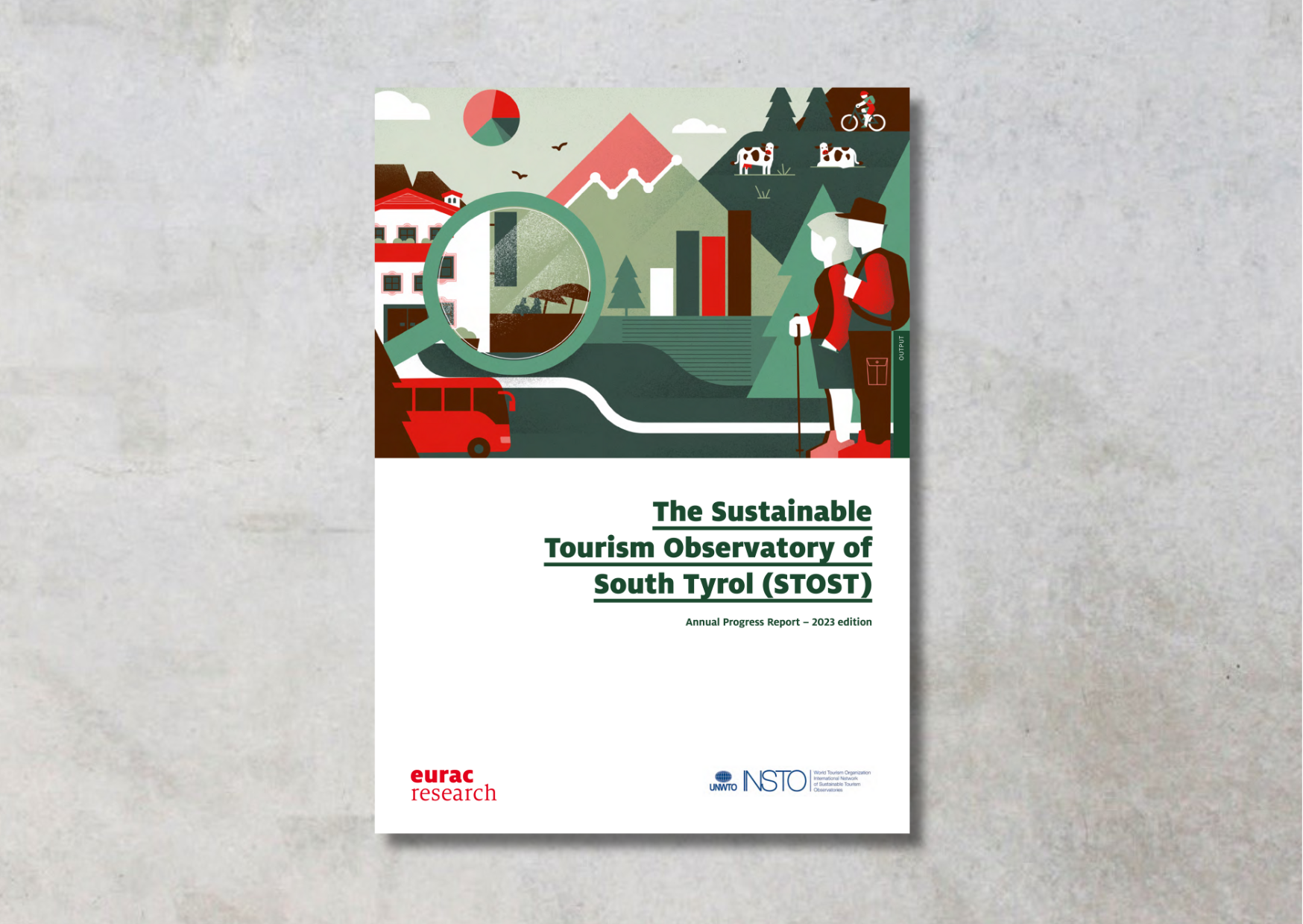
Authors: Felix Windegger, Valentin Wallnöfer, Maximilian Walder, Philipp Corradini, Francesca Cornella
Colophon: Bolzano, Eurac Research, Center for Advanced Studies, 2023
Pages: 84
Report Abstract: After an almost complete lack of touristic activity due to the Covid-19 pandemic in 2020 and small steps towards recovery in 2021, the year 2022 marks the moment of full recovery for the sector in South Tyrol. Indeed, in 2022, 7.9 million arrivals and 34.4 million stays were registered in South Tyrol, surpassing the numbers of the pre-pandemic record year of 2019. Simultaneously, the long-term trend towards more beds per accommodation facility (i.e. larger facilities) has continued, just like the trend towards higher star categories of hotels. In addition, accommodation services outside of traditional hotel structures, such as campsites, private accommodations and agritourism ventures, are growing in importance, making up 64.8% of all accommodation facilities and providing 34.6% of all beds. Finally, concerning the origin of guests, in 2022 we can observe a return to the pre-pandemic market distribution, with German (48.4%) and Italian (31.5%) guests being responsible for the bulk of overnight stays.
Annual Progress Report 2022
The Sustainable Tourism Observatory of South Tyrol (STOST)
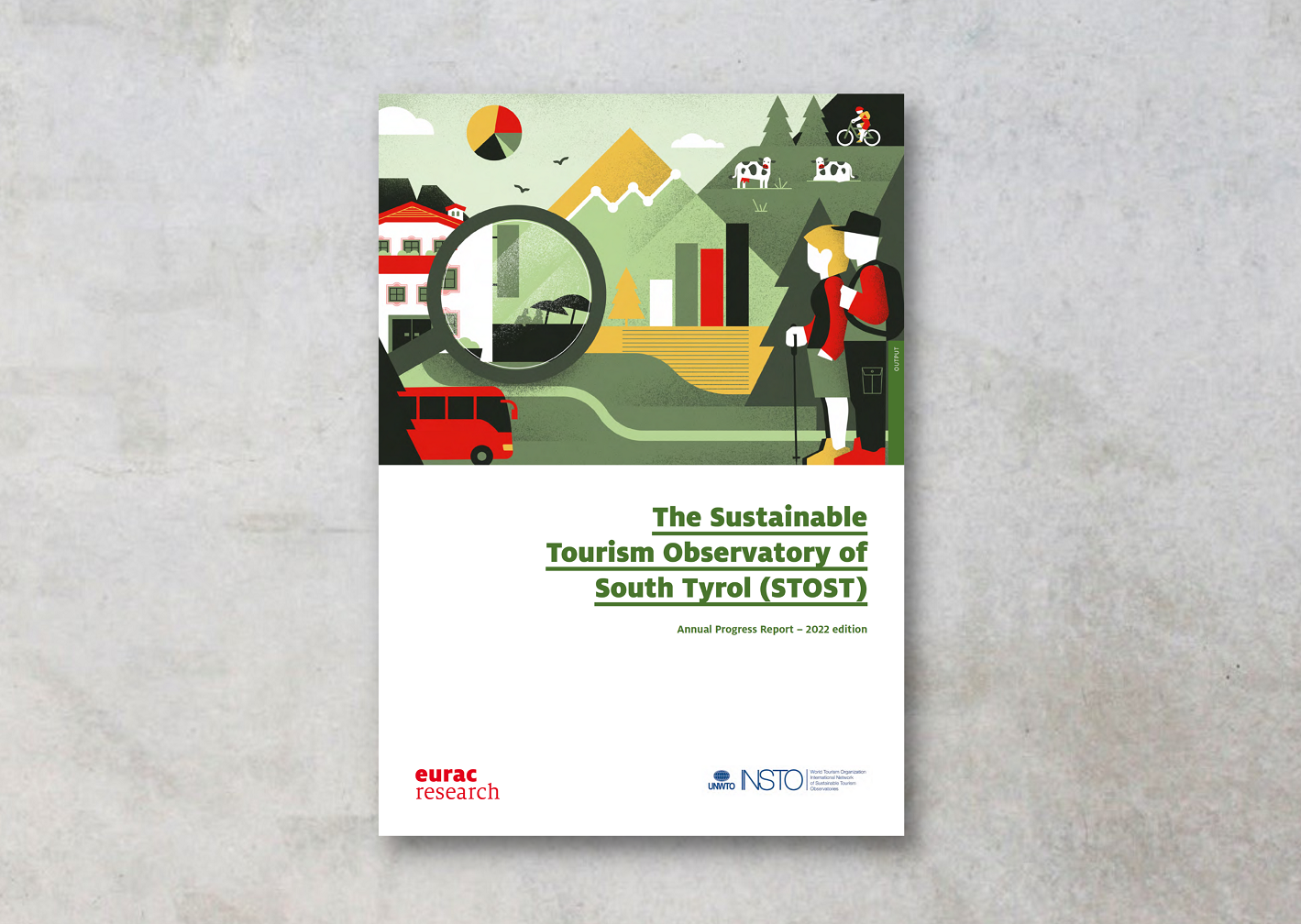
Authors: Felix Windegger, Anna Scuttari, Maximilian Walder, Greta Erschbamer, Michael de Rachewiltz, Philipp Corradini, Zoe Krueger Weisel, Daria Habicher, Linda Ghirardello, Valentin Wallnöfer, Giulia Garzon, Pauli Moroder
Colophon: Bolzano, Eurac Research, Center for Advanced Studies, 2022
Pages: 128
Report Abstract: After two pandemic years, the tourism sector has finally started its recovery. In this phase, sustainable tourism observatories are transforming their role again, turning into instruments to monitor the resilience of the tourism sector and the permanent transformation driven by crises such as climate, demographic or economic crises, and especially driven by the Covid-19 crisis.
Questions to be answered in this phase relate to the correlation between demand recovery and job (re)creation, but they also refer to local acceptance towards tourism and destination competitiveness after a critical phase. In this transformative scenario, observatories were putting sustainability at the top of the recovery agenda, following the claim #buildbackbetter of the UNWTO.
The Italian Autonomous Province of Bozen/Bolzano (South Tyrol) understood the pandemic as an opportunity to reshape the tourism culture and to check if the development principles used so far fit the expectations of the local population. More than ever, local inhabitants’ voices have become an important factor in the discussion and definition surrounding maximum growth limits of tourism. Both regional and local surveys were organized with local partners to investigate their expectations. Further, the local government – after a long planning and political negotiation process – was able to establish a moratorium for tourism accommodation facilities. This means a substantial reduction of developmental speed and slowdown of quantitative growth as an important additional parameter for sustainable development in South Tyrol.
Annual Progress Report 2021
The Sustainable Tourism Observatory of South Tyrol (STOST)
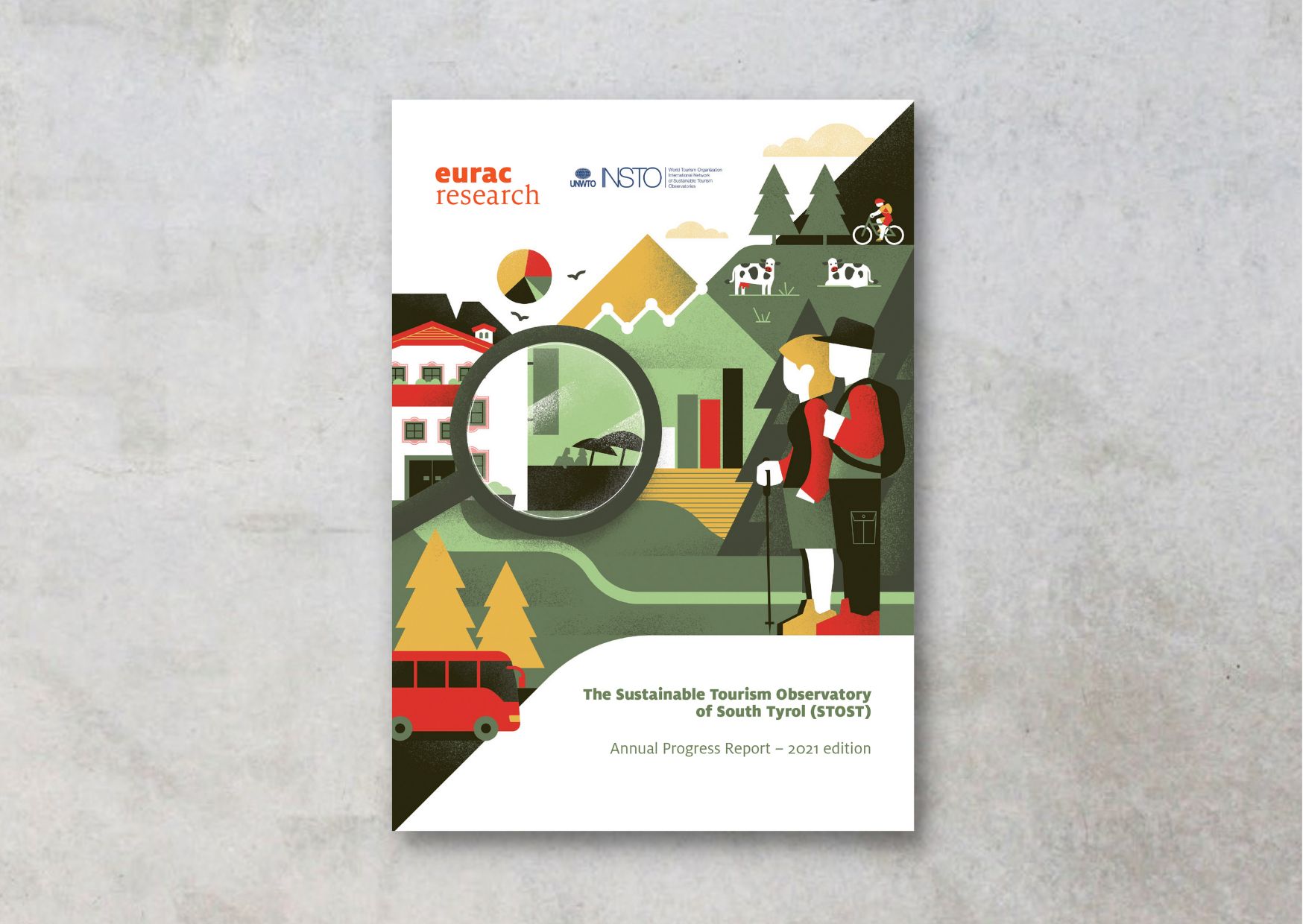
Authors: Michael de Rachewiltz, Andreas Dibiasi, Filippo Favilli, Linda Ghirardello, Daria Habicher, Peter Laner, Andrea Omizzolo, Anna Scuttari, Alessio Tomelleri, Thomas Trienbacher, Maximilian Walder, Sarah Watschinger, Felix Windegger
Colophon: Bolzano, Eurac Research, Center for Advanced Studies, 2021
Pages: 102
Report Abstract: Sustainable tourism observatories have strengthened their role as a tourism intelligence tool during the Covid-19 pandemic. They were able to capture and assess short, medium and long-term changes in destinations and to support policies for a sustainable tourism future. As difficult as they are, the pandemic years represent a vacuum in which destinations have been able to rethink their development, without having to deal with their daily businesses. The Italian Autonomous Province of Bozen- Bolzano (South Tyrol) used the lockdown-seasons to strengthen a common understanding of sustainability in tourism and to set up a programme for destination labelling according to international standards. The crisis was a chance to make the necessary choices.
In its third year of activity, the Sustainable Tourism Observatory of South Tyrol (STOST) supported this repositioning process by implementing several monitoring tools. Besides the regular and timely monitoring of thirteen issue areas, sample surveys were used to rapidly assess and evaluate the recovery phase. These tools allowed to evaluate the impact of Covid-19 in economic terms, but also in terms of product and process innovation in accommodation facilities. They also highlighted changes in tourist markets, that are becoming less international and more interested in outdoor activities. Tourism is changing and the main goal of STOST is to understand its new shape, and to support smart policy decisions.
Annual Progress Report 2020
The Sustainable Tourism Observatory of South Tyrol (STOST)
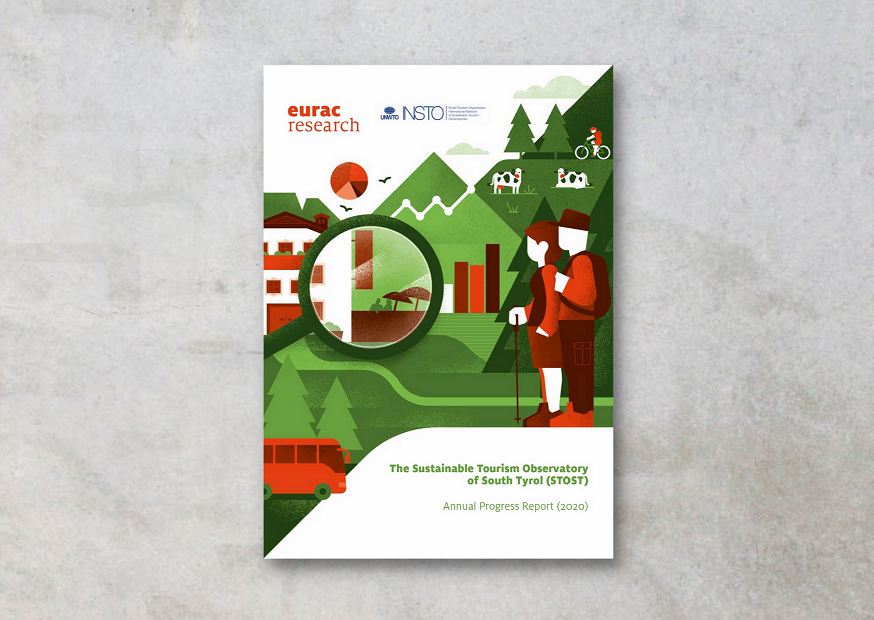
Authors: Michael de Rachewiltz, Andreas Dibiasi, Greta Erschbamer, Valeria Ferraretto, Linda Ghirardello, Daria Habicher, Anna Scuttari, Maximilian Walder, Felix Windegger
Colophon: Bolzano, Eurac Research, Center for Advanced Studies, 2020
Pages: 108
Report Abstract: Notwithstanding the global Covid-19 crisis, tourism remains an important economic and social phenomenon. The growing awareness of the reciprocal effects of tourism on the economy, society and environment paired with the growing acceptance of the sustainable development principles demand an increasingly strong focus on monitoring issues.
STOST (The Sustainable Tourism Observatory of South Tyrol) has increased its competences and outputs, focusing not only on the fine-tuning and update of existing monitoring indicators, but also on the effects of the pandemic on site and on the consideration of culture as an additional issue to investigate. STOST offers a chance to understand tourism from a broad perspective and enables multi- and interdisciplinary work and knowledge transfer, networking and best practice exchange that can be fruitful also for other economic sectors. Ultimately, the current pandemic crisis illustrated the importance of the STOST in providing timely and reliable information about up to date developments and by that providing the basis for a fact-based decision making of local authorities.
Annual Progress Report 2019
The Sustainable Tourism Observatory of South Tyrol (STOST)
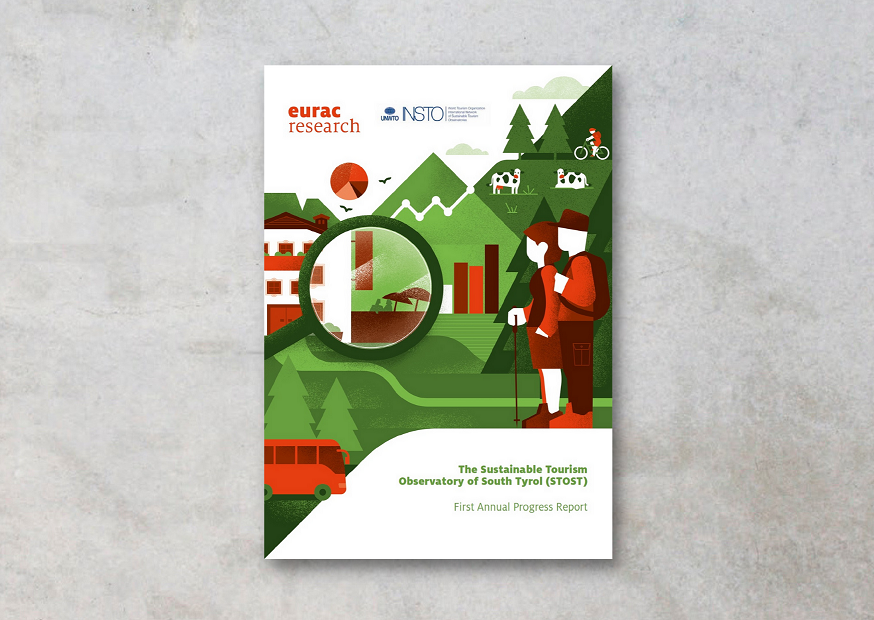
Authors: Anna Scuttari, Valeria Ferraretto, Andreas Dibiasi, Giulia Isetti, Greta Erschbamer, Simone Sartor, Daria Habicher, Michael de Rachewiltz
Colophon: Bolzano, Eurac Research, Center for Advanced Studies, 2019
Pages: 104
Report Abstract: South Tyrolean tourism has a record number of arrivals and visitors year after year. These numbers are brilliant for the economy, but they raise some questions about the sustainability of the tourism system. What does the arrival of 7.5 million tourists every year mean for the South Tyrolean population? What effects does tourism have on the environment? And how can we keep the tourism sector thriving by limiting its impact on nature and man? To manage it, you need to know.
With this awareness, the first Annual Progress Report presents some data and facts about the sustainability of the tourism sector in South Tyrol, which have been analyzed within the project “Sustainable Tourism Observatory of South Tyrol”, an observatory on sustainable tourism designed by the Center for Advanced Studies at Eurac Research and part of the World Tourism Organization (UNWTO). The study analyses tourism at 360°, starting from the effects on employment and the economy, but also touching on the effects on the quality of life of South Tyroleans, for example the increase in the prices of consumer goods, and finally the consumption of resources such as water and energy.
